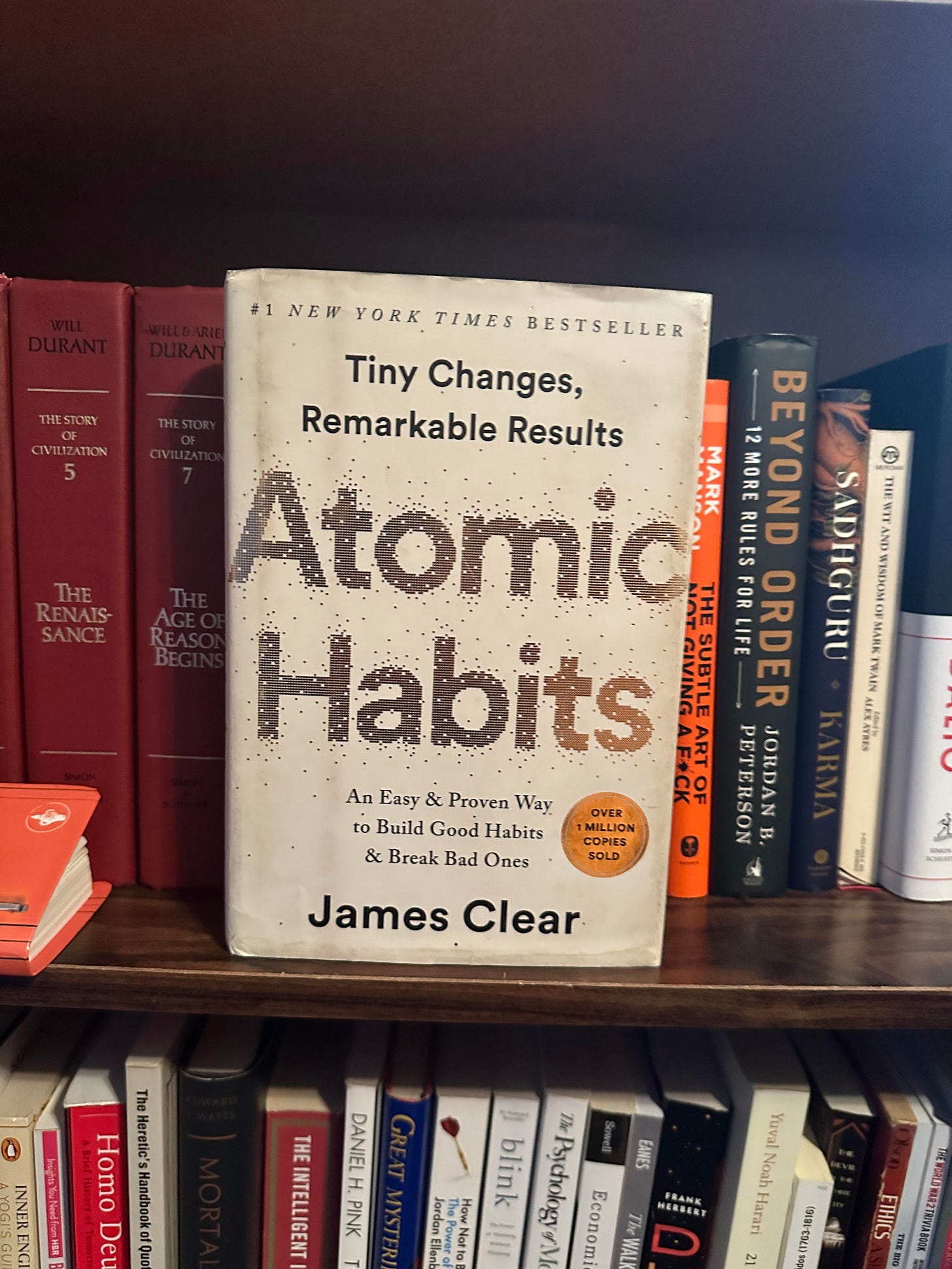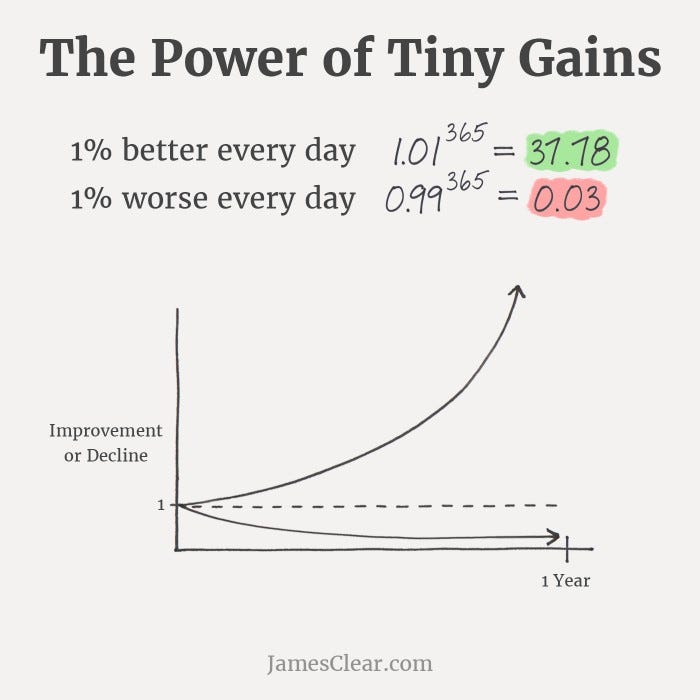Atomic Habits by James Clear
Three Point Summary | Notes on big ideas from intriguing books
Jeff Sullivan's Three Pointers
James Clear is a writer and speaker focused on habits, decision making, and continuous improvement. He is the author of the #1 New York Times bestseller, Atomic Habits. The book has sold over 5 million copies worldwide and has been translated into more than 50 languages.
This book changed my life for the better. I apply the basic lessons from it every day to develop my strength in writing, basketball, weight-lifting, language-learning, and more.

“Habits are the compound interest of self-improvement.”
James Clear
I. Awareness & Attention
In the beginning half of the book James Clear explains:
The process of behavior change always starts with awareness. You need to be aware of your habits before you can change them.
Some experts estimate that half of the brain’s resources are used on vision. Given that we are more dependent on vision than on any other sense, it should come as no surprise that visual cues are the greatest catalyst of our behavior. For this reason, a small change in what you see can lead to a big shift in what you do.
These ideas are big reasons why I’m so obsessed about how I use my attention. The fastest way to change your life is to change what you pay attention to.
II. Genetics
A brilliant part of this book is when Clear talks about genetics:
You don’t have to build the habits everyone tells you to build. Choose the habit that best suits you, not the one that is most popular…When you can’t win by being better, you can win by being different…The best way to ensure your habits remain satisfying over the long-run is to pick behaviors that align your personality and skills. Work hard on the things that come easy.
Ask yourself the questions:
What feels like fun to me, but work to others?
What makes me lose track of time?
Where do I get greater returns than the average person?
What comes naturally to me?
The answers to these questions are your destiny.
Working on this Substack, playing basketball, and learning languages are some answers to these questions for me. Which is why I’m obsessed with pursuing mastery in them. And hopefully, in time, I’ll make money off them.
This also brings to mind Naval Ravikant’s idea that ‘no one can compete with you on being you.’
Double down and work extra hard on the things that come easy.
Our genes shape who we are. But we must not fall for the trap of thinking we can’t change our ways because of them:
Your genes are operating beneath the surface of every habit. Indeed, beneath the surface of every behavior…Bundled together, your unique cluster of genetic traits predispose you to a particular personality.
But genes do not determine your destiny. They determine your areas of opportunity. As physician Gabor Mate notes “Genes can predispose, but they do not predetermine.”
An easy cop out for continuing with negative habits is to blame it on your genes.
There’s been many times where I’ve been drinking too much and rationalize it by saying something ridiculous like ‘It’s because I’m an Irish bastard!’
I am an Irish bastard. But just because Irish people are notoriously booze-bags doesn’t mean I’m locked into being an alcoholic. Predisposed, not predetermined. Everyone has the ability to choose what actions they do or don’t commit.
Believing you can’t change your habits because ‘that’s just how you are’ (your genes) makes you weak. Avoid that type of thinking. It’s false.
III. Discipline & Repetition
If there’s one thing you take away from this article, remember the following idea from Clear:
Boredom is perhaps the greatest villain on the quest for self-improvement.
At some point it comes down to who can handle the boredom of training every day, doing the same lifts over and over and over.
Whether it’s business or sports or art, you hear people say things like “It all comes down to passion.” Or, “You have to really want it.” As a result, many of us get depressed when we lose focus or motivation because we think that successful people have some bottomless reserve of passion. But really successful people feel the same lack of motivation as everyone else. The difference is that they still find a way to show up despite the feelings of boredom.
Successful people don’t rely on motivation. They rely on discipline.
Even if there’s an activity that comes naturally to you and you enjoy doing, daily repetition can become boring. This is because humans tend to desire novel experiences. New things excite us.
But by having discipline, you do whatever you’re trying to improve in every day regardless of how you feel. Regardless of whatever random desire to do something else you may have that day. Which actually makes you feel better in the long run, due to your consistency with positive habits.
Clear also dives into some neuroscience to show the magic of repetition over time:
Habit formation is the process by which a behavior becomes progressively more automatic through repetition…Neuroscientists call this long-term potentiation, which refers to the strengthening of connections between neurons in the brain based on recent patterns of activity. With each repetition, cell-to-cell signaling improves and the neural connections tighten.
There is nothing magical about time passing with regard to habit formation. It doesn’t matter if it’s been twenty-one days or thirty days or three hundred days. What matters is the rate at which you perform the behavior. You could do something twice in thirty days, or two hundred times. It’s the frequency that matters.
It’s remarkable what you can build if you just don’t stop. Small habits don’t add up. They compound.
Imagine how good you can be at something if you do it every day. For a long time. Not say you’re going to do it every day, then do it sometimes. Like, actually every day. No exceptions. Uninterrupted compounding of skill. By doing the thing. Every. Single. Day.
Who you are is the sum of four things:
your genetics
your friends
what you pay attention to
your habits
You can’t change #1. So focus on #2, #3, and #4. If you choose #2 and #3 carefully, it’s easier to cultivate positive #4s.



This is a great book! Nice job, Jeff!
I read this book last year. I think it should be required reading in high school. Self discipline and showing up are half the battle to success. Having worked in education for 35 years, I see that students with these qualities are able to achieve their goals.